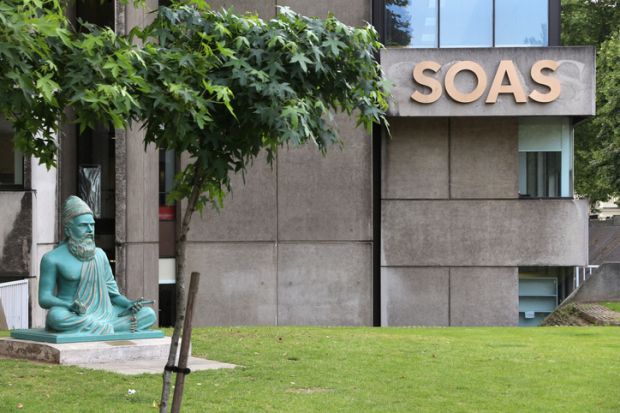Staff at two London-based universities are considering strike action over restructuring plans, the latest in a series of new industrial disputes to embroil the sector.
An “indicative ballot” has been launched at SOAS University of London over planned changes to the institution’s English-language and study skills support services.
Goldsmiths, University of London, is also facing strikes after the University and College Union (UCU) called a ballot over its “transformation programme”, which the union said could result in the loss of 130 full-time equivalent posts.
Universities across the UK have looked to cut jobs and close courses amid a recruitment downturn and financial crunch caused by the tuition-fee freeze coupled with spiralling costs.
Goldsmiths blamed “a significant financial shortfall arising from lower than budgeted student recruitment for the academic year 2023-24, the long-term decline of certain subjects and the decline in student metrics” for its planned cuts.
UCU said, given that many staff were on part-time contracts, “far more” than 130 would be affected. Redundancies will be concentrated in the departments of theatre and performance, history, English and creative writing, visual cultures, politics and international relations, music, anthropology, sociology, educational studies, psychology and social, therapeutic and community studies.
At SOAS, 34 staff members who work in its international foundation courses and English language studies have been placed in a redundancy pool and will have to reapply for their jobs, with some facing worse terms and conditions if they are rehired, UCU said.
All term-time support for international students will be lost owing to the cuts to the service, which will “devastate the quality of education on offer at SOAS”, the union claimed.
The initial ballot runs until 6 March and, if successful, UCU said, it would pave the way for a further vote on whether to hold industrial action, unless the institution’s management ruled out compulsory redundancies.
UCU SOAS branch chair Kerem Nisancioglu said: “It’s not clear why SOAS is cutting staff while making profits. University management claims these services are returning a deficit of only £65,000, but even this figure is misleading when set against the benefit they make to educational provision.”
A spokesperson for SOAS said a “small number of courses” offered by its Foundation College had seen a “significant decline in student numbers” and so changes were needed to ensure its long-term viability.
“We are currently consulting with staff about a reduction in a small number of staff for undersubscribed courses, which equates to the loss of 9.75 full-time equivalent roles,” the spokesperson said.
“We recognise that any period of change is unsettling for staff, and we are mitigating the impact with measures such as voluntary severance or redeployment to areas of the university that are growing as a result of the overall rise in student numbers at SOAS.”
At Goldsmiths, the planned restructure comes only two years after staff held 37 days of strike action during a fractious 10-month dispute that former professor Les Back described at the time as “like living through an academic civil war”.
UCU general secretary Jo Grady said the previous recovery plan “was supposed to fix issues at Goldsmiths” and the fact that more cuts had been announced so soon was “yet more evidence that senior managers are unable to turn things around on their own”.
“Knee-jerk reactions that seek to make eye-watering cuts in an extremely short time frame will only further destabilise the university,” Dr Grady said.
“Senior managers urgently need to work with us to increase recruitment and grow the university. If they refuse to listen to staff and instead try to force through these brutal cuts, they are opening the door to severe disruption.”
The warden of Goldsmiths, Frances Corner, said: “Universities across the UK are facing unprecedented financial challenges as a result of a neglected funding system which is widely acknowledged as not delivering for students, organisations and the public.
"Sadly, Goldsmiths is not immune to these pressures and we are taking action to overcome these issues. Our work so far has secured significant savings, but we need to do more to put us on a sustainable financial footing, including making difficult decisions.
“Regrettably, this means we are now proposing compulsory redundancies and we will do everything we can to keep job losses to a minimum.”
Register to continue
Why register?
- Registration is free and only takes a moment
- Once registered, you can read 3 articles a month
- Sign up for our newsletter
Subscribe
Or subscribe for unlimited access to:
- Unlimited access to news, views, insights & reviews
- Digital editions
- Digital access to THE’s university and college rankings analysis
Already registered or a current subscriber? Login







